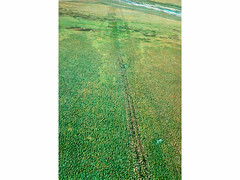Shell wins bid for ANWR offshore drilling leases
The tracts that got the most attention from Shell stretched from waters off the yet-undeveloped Point Thomson unit west of the refuge to areas northeast of Kaktovik, an Inupiat Eskimo village on the eastern edge of the refuge.
A Shell spokeswoman said the company's interest was not driven by recent Senate actions to open the Arctic refuge to drilling. But a reasonable person might conclude otherwise. Shell's offshore leases might be strategic for the company in terms of operational efficiencies if ANWR drilling does get approved. It is noteworthy that Shell has not been active in oil extraction in Alaska since the 1980s.
“This is just an indication that in the current political climate, they are trying to lease every single acre in the arctic, regardless of the concerns of the North Slope community for subsistence,” Eleanor Huffines of The Wilderness Society’s Alaska office told the Reuters news agency.



